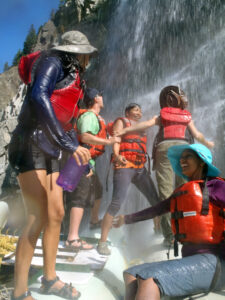
This whole conversation on the current dominant narrative around freshwater health in Canada points to both challenges and opportunities that as non-profit freshwater champions we need to embrace, to both alter the dominant narrative (that freshwater values exist in our subconscious, that acting to protect water results in negative economic decisions and that we don’t have any control or impact in decisions that affect freshwater health) and to promote a new narrative (one where guardianship is central, where we listen to, celebrate and honour the role water plays to our lives, and where we engage as active citizens around decision to protect, enhance and defend its health).
In this new water narrative, water literacy is key – not only do we celebrate our memories of water but we know about our local waters. This is exemplified by knowing that the water from our taps comes from local water sources. Currently only 43% of Canadians will attempt to identify their drinking water source. 57% don’t know or won’t even hazard a guess as to where their water comes from. We will know that we are altering the dominant water narrative when this statistic changes. Furthermore, when communities can clearly identify the local threats to healthy waters and feel that it is within their power to influence decisions around water, we will know that we are succeeding at changing the dominant water narrative of today.
Finally, we will know that the dominant water narrative is changing when the rich history, cultural connection and knowledge that indigenous communities hold over the waters of Canada is given its appropriate place. Our region’s founding stories relate to and are inextricably tied to water. A sharing of these founding stories can improve how we perceive waters but can also deepen understanding of indigenous rights, treaties and indigenous governance.
This blog series is inspired by a ½ day exploratory conversation convened through the Our Living Waters Network. At the meeting, a small group of network members and supporters explored the dominant freshwater narratives that we’ve encountered in our work for freshwater health across Canada. Participants of the workshop included: Canadian Freshwater Alliance, Great Lakes Commons, Mountain Equipment Co-op, Lake Ontario Waterkeeper, and Tides Canada. The opinions throughout the series represent those of the author and not necessarily any of the workshop participants.